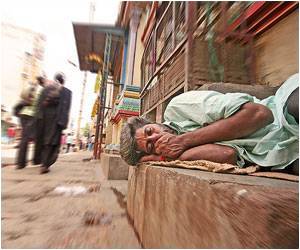The homeless are both the
bane and pity of our society. They stand
out as the lowest, the outcast, those who perpetually don’t fit in. In 2005 there were 744,000 homeless people in
the United States
 Not
all of these homeless are the same. Some
will only be on the streets for a night or a week or a month. These have lost jobs and fallen on hard
times. For others, they have a network
of supporters sufficient enough to give them a place to crash for a period of
time. But for many, the hard times
perpetuate over years, sometimes even decades. These are the chronic homeless
and they stand out as the most obvious failure of our society.
Not
all of these homeless are the same. Some
will only be on the streets for a night or a week or a month. These have lost jobs and fallen on hard
times. For others, they have a network
of supporters sufficient enough to give them a place to crash for a period of
time. But for many, the hard times
perpetuate over years, sometimes even decades. These are the chronic homeless
and they stand out as the most obvious failure of our society.
James was living on the streets of Gresham
How are we supposed to react to the homeless?
Many of us look at the
homeless in disgust, knowing that if they would just shake their addiction and
apply themselves they could get a job and get back on their feet. Others of us look at the homeless and feel
sorrow and sympathy wanting to help, but only able to throw a dollar their
way.
But as believers in Jesus Christ, how are we supposed to
react? Many believers think that if the
homeless would just commit themselves to Jesus, then their lives would get
straightened out and they could be normal participants in society. What many Christians don’t know is that at
least a third of those who live on the street already have committed themselves
to Jesus and are doing their best to live a Christian life. Yes, some are addicts, but not all. Many are mentally ill, but we cannot blame
homelessness exclusively on mental illness, either.
How does Scripture tell us to react to these poor and
outcast of society?
- We are to show respect to the poor. James 2
- We are to respond in love and compassion to
everyone in need. Luke 10
- We are to offer help, especially to
believers. Galatians 6:10
- We are to offer hospitality, clothing, shelter
and food. Matthew 25:31-46
- We are to offer fellowship and peace. Romans 12
Most of all, according to
Scripture, we are to love. This doesn’t
always mean giving money or food, although we shouldn’t be closed to that. But it does always mean being patient, being
kind, not putting ourselves over the other person, but bearing other’s burdens
and enduring with them. I Corinthians 13
 Bill lived in
Bill lived in
A New Paradigm
As the people of Jesus who
reached out to the outcast, we are not to stand at a distance from the
homeless. We must not separate ourselves
from the lowest in society—whoever they are.
Can we continue our practice of throwing evangelistic messages and food
out our door to the cold and grief-stricken, while we stay warm, comforted and
well-fed in our buildings? Some of these
outcast we need to embrace as brothers and sisters, and others we need to
embrace as the poor who need our help.
As the people of the Book which teaches compassion, we must stand with
those on the street.
But how are we to do this? Thousands of homeless are just too much for
any church to bear, let alone the small percentage of the church that are
stirred by the Spirit to assist the homeless.
But the Lord has not called us to help the massive crowd, only those we
know. To assist the homeless is not a
matter of a huge ministry with hundreds of thousands of dollars. Rather it is a one-on-one ministry.
James took Bill to his street church and Bill’s eyes
were opened. There were maybe a hundred
homeless in Gresham
A Personal Welcome From the Church
This story should be
replicated in every church. If every
church in our urban areas had perhaps two people among their congregations who
would be a friend and support for a single homeless person, then our whole
society would change. The homeless would
no longer be outcast, nor strangers in our midst. They would be members of our churches,
participants in our society and our friends.
Very few churches have the resources to have a
shelter. And it is not necessary for
every church to have a food ministry.
But there is one need of the homeless that every urban church can
help—their isolation. The strength of
the church is not our money, nor our political power. Rather, the strength of Christians has always
been their love, their sacrifice and their welcome. If we take these strengths and focus them on
the homeless, then the American urban landscape will change. The church will have a new people. And Christ will be glorified.










